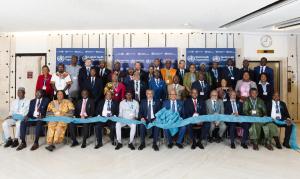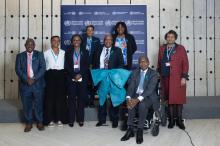World Health Assembly endorses 17 November as World Cervical Cancer Elimination Day: South Africa and Nigeria lead Member States in advancing a dedicated Global Day of Action
Pretoria, South Africa/ Geneva, Switzerland Member States at the 78th session of the World Health Assembly have adopted a resolution to designate 17 November as World Cervical Cancer Elimination Day. Brought forward by South Africa and Nigeria, and co-sponsored by over 60 countries from across WHO regions, the resolution affirms growing international commitment to eliminating one of the most preventable cancers affecting women.
The resolution institutionalizes what has, over the past four years, become a growing annual tradition—the Cervical Cancer Elimination Day of Action. This initiative, anchored to the launch date of WHO’s Global Strategy in 2020, has galvanized countries, health workers, civil society, and survivors to promote awareness, expand access to HPV vaccination, screening and treatment, and advocate for stronger health systems.
This is more than a symbolic designation—it signals global alignment around a focused, coordinated effort toward achieving the 90-70-90 targets,” said Ms Shenaaz El-Halabi, WHO Representative to South Africa. “We commend South Africa and Nigeria for their leadership and reaffirm our shared commitment to ensuring that all women and girls in South Africa—regardless of their income, location, or background—can access the services needed to prevent and treat this disease.”
From advocacy to action
Over the past four years, 17 November has evolved into a key milestone for countries and communities. Governments, frontline health workers, and advocates have marked the Day of Action with vaccination drives, screening campaigns, community dialogues, media outreach, and the illumination of iconic landmarks across all regions of WHO. These efforts have helped raise awareness, expand services, and build broad support for elimination. This growing momentum contributed to the resolution’s adoption at WHA78.
With its formal designation, the resolution EB156(22) now establishes a permanent space on the global health calendar—providing an annual opportunity to review progress, renew commitments, and maintain visibility.
Cervical cancer could become the first cancer in history to be eliminated, thanks to HPV vaccines and timely screening and treatment,” said Dr Tedros Adhanom Ghebreyesus, WHO Director-General. “By designating 17 November as World Cervical Cancer Elimination Day, Member States have created a powerful reminder of our collective responsibility to advance the health of women and girls everywhere.”
A shared commitment to elimination
The resolution reflects a growing consensus that eliminating cervical cancer is achievable through sustained leadership, investment, and collaboration. By anchoring the Day of Action in the global health calendar, Member States have created a consistent opportunity to monitor progress, engage partners, and reinforce accountability.
The day also supports the core targets of the WHO Global Strategy: 90% of girls fully vaccinated with the HPV vaccine by age 15; 70% of women screened using a high-performance test by age 35, and again by age 45; and 90% of women with pre-cancer treated and 90% of women with invasive cancer managed. These targets offer a clear path forward to reduce preventable deaths and promote equity in access to care.
“This resolution reflects the power of collective voice—when countries speak together, they elevate issues that matter most to communities. The Day of Action gives us a unifying platform to drive change, hold ourselves accountable, and deliver on the promise of elimination.”- Dr Nono Simelela, Advisor to the Minister of Health, National Department of Health, South Africa
South Africa’s ongoing commitment
South Africa continues to play a pivotal role in advancing the global cervical cancer elimination agenda through both national action and international leadership.
With WHO support, the country is finalizing a National strategic framework for cervical cancer elimination, placing strong emphasis on equity and prioritizing women living with HIV. A key component of the strategy is the transition toward HPV DNA testing as the primary screening method—now implemented in 43 of 52 districts, supported by provincial-level training.
To further strengthen service delivery, South Africa plans to introduce a test-and-treat model across 18 districts, aimed at reducing turnaround time and improving access to treatment in underserved areas.
At the global level, South Africa is leveraging its G20 Presidency to spotlight cervical cancer elimination as a flagship health priority linked to universal health coverage, gender equity, and sustainable financing. It will also co-host the Second Global Forum on Cervical Cancer Elimination in June 2025, providing a platform to highlight national progress, strengthen partnerships, and shape future action.
Learn more about WHO’s work on cervical cancer elimination: https://www.who.int/initiatives/cervical-cancer-elimination-initiative




